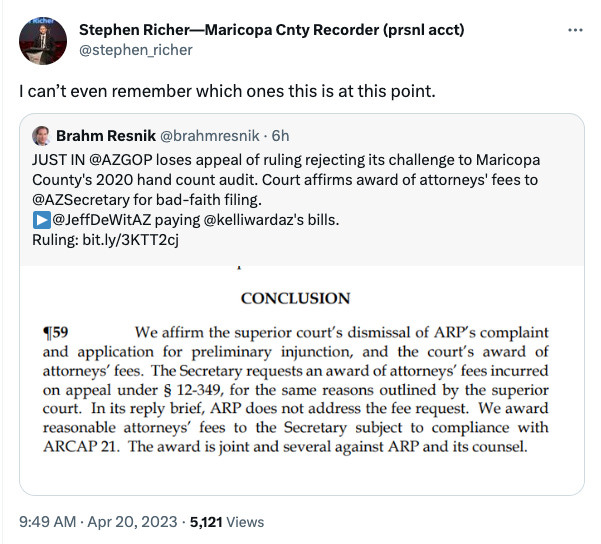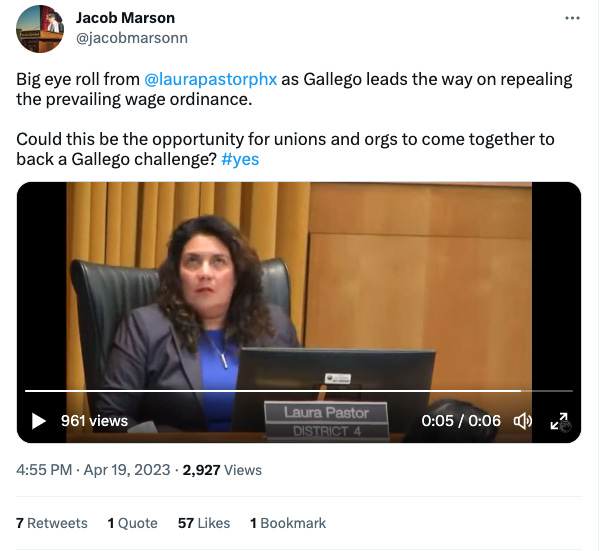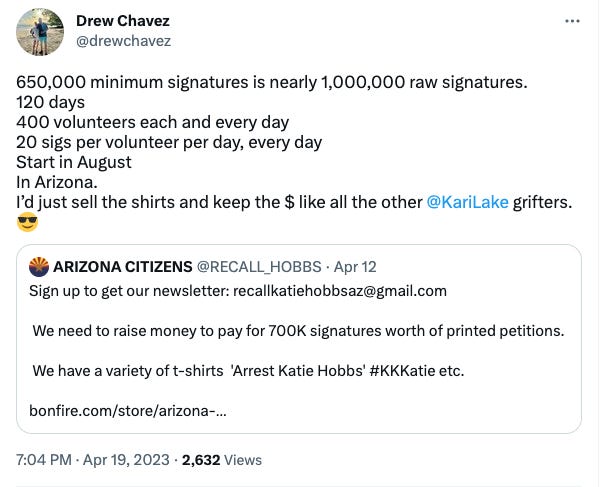The Daily Agenda: 2020 was several years ago
But the lawsuits still aren't over ... Wendy Rogers goes full snowflake ... And we actually pay enough, thanks.
Two lingering legal battles from the 2020 election just wrapped up (sorta), with both requiring those who perpetuated election lies to pay up.
American Oversight, a liberal watchdog group, settled a long-running public records fight with the Arizona Senate and Cyber Ninjas.
And separately, the Arizona Court of Appeals upheld a lower court ruling against the Arizona Republican Party, which sued Maricopa County for hand-count auditing vote centers instead of precincts, requiring the state party to pay attorneys’ fees for both the lower and appellate court cases.
In the audit records case, both American Oversight and the Republic fought to unearth documents related to the Senate’s audit of Maricopa County’s 2020 election and were successful in getting thousands of pages of documents from both the Senate and the Cyber Ninjas as its contractor that helped the public better understand the unprecedented ballot review.
As part of the settlement agreement, the Senate (read: Arizona taxpayers) will have to pay American Oversight $153,000.
The group said it decided to settle because it had “succeeded in bringing much-needed transparency to the ‘audit,’ with the Arizona Senate and Cyber Ninjas having released tens of thousands of pages of records as a result of litigation that provide the public with valuable information about how the review was conducted and why.”
The Republic isn’t done fighting yet, though. The state’s paper of record still wants to get access to some documents the Senate has claimed are private because of a “legislative privilege” exemption to public records law.
The AZGOP lawsuit against Maricopa County might not be done yet either, but the bills are stacking up.
The Arizona Court of Appeals said the Maricopa County Superior Court correctly decided the county can hand-count audit vote centers instead of precincts and correctly awarded about $18,000 in attorneys’ fees to the Secretary of State’s Office in the case. And the court said the secretary can now get more fees covered for the cost of the case at the appellate level.
The Arizona Republican Party could ask the Arizona Supreme Court to weigh the issue, but that court hasn’t shown a willingness to engage with election deniers so far. The party said it was “surprised by the court’s decision,” making it literally the only one who was surprised at that outcome. The AZGOP is still deciding whether to appeal.
The Court of Appeals wasn’t persuaded by arguments that the First Amendment protected the party or that the party didn’t claim its case was about election fraud, nor did it buy that the lower court awarded attorneys’ fees for political reasons.
“Further, like the superior court, we are not imposing any new requirement or limitation on the filing of an election-related lawsuit,” the Court of Appeals wrote. “Instead, as with any lawsuit, claims filed in an election matter are subject to the well-established principles—derived from statutes, rules, and case law—that govern all civil lawsuits in this state.”
Wrapping up these two 2020 issues shows just how long the tail of election fraud claims can be. It’s been well over two years since the 2020 election, but the courts are still spending time untangling the lawsuits associated with it.
The parties that continued to spread election lies, even in court, are solidly in the “find out” stage, and the bills are finally coming due for the ways they’ve misused the courts with flimsy arguments.
Arizona Sen. Wendy Rogers, who can write blustery tweets for days, apparently cannot answer questions about where she lives from a reporter and is afraid if said reporter rings her doorbell.
Rogers got a restraining order from a Flagstaff Justice Court against Arizona Capitol Times reporter Camryn Sanchez, who has been investigating whether Rogers actually lives in the Flagstaff district she represents and whether she’s ripping off taxpayers by claiming mileage and legislative per diem based on houses she owns but doesn’t live in.
Sanchez found that Rogers purchased a home in Chandler earlier this year after living in a Tempe home before that. Neither Chandler nor Tempe are in Flagstaff.
Sanchez went to Rogers’ homes in Tempe and Chandler to seek comment on Rogers’ residency issues, a standard practice for journalists, especially those who can’t get comment at a lawmaker’s workplace.
Rogers previously asked Senate President Warren Petersen to get Sanchez booted from the Senate for asking her questions, but instead Sanchez was asked not to approach Rogers on the Senate floor. Rogers also tried to get the Flagstaff judge to prevent Sanchez from going to the Senate, but was denied.
It’s cowardly enough when politicians don’t answer questions from the public — that’s a key part of their job, but an increasing number decide against transparency.
But filing a restraining order is another level. The fact a judge granted it is even more surprising, given the clear First Amendment issues at play. We expect the Capitol Times to strenuously fight against Rogers and the Senate’s thin skins to help Sanchez continue to do her job. And we expect them to win.
In the meantime, we need Rogers to answer for where, exactly, she lives. Even though residency questions in Arizona often resolve in favor of a lawmaker, it matters to the people she represents that she actually lives in the community she says she does. It especially matters if she’s claiming mileage for driving home to a place where she doesn’t live.
Democrats vs Democrats: Phoenix Mayor Kate Gallego’s new majority on the Phoenix City Council repealed a recently passed ordinance that set a prevailing wage for construction workers on city projects last week, the Republic’s Taylor Seely reports. The repeal came after Democratic Arizona Sen. Catherine Miranda filed a 1487 complaint over the ordinance, the first such complaint filed since Democratic Attorney General Kris Mayes took office. Democrats have historically derided 1487 complaints, which threaten to yank state money from cities if they defy state law.
Gotta read the applications: The state pulled back its approval for two new wells sought by a Saudi Arabia-owned farm Fondomonte Arizona, Mayes said, noting the previous approval happened in August, under a previous administration. Mayes told AZFamily’s Morgan Loew that her office found “inconsistencies” in the applications and alerted the state land department, which then rescinded the permits. The issue of Saudi farming — where Saudi-owned companies grow alfalfa here with cheap water to feed cattle in Saudi Arabia — came up on the campaign trail last year.
Sorry, tamales: Democrats won’t lend their votes to a veto override of the so-called “tamale bill” that the majority of them previously supported, the Senate Democrats said on Friday. They said they’ve since learned of health concerns over the bill and would be willing to work with Republicans to address those concerns, but wouldn’t "engage in political power struggles" against the governor.
Livin’ large: U.S. Sen. Kyrsten Sinema likes the finer things, the New York Post’s Lydia Moynihan reports after reading through Sinema’s campaign finance reports. She’s spent big at vineyards, at “posh restaurants” in the U.S. and Europe, on charter flights and car services. The spending has some donors upset and seeking refunds. Despite the campaign largesse, let’s not forget she also sells her used items on Facebook Marketplace.
We have lots of questions: The City of Phoenix plans to close off and start cleaning up the homeless encampment in central Phoenix starting in May, with police likely enforcing the closure, the Republic’s Juliette Rihl reports. The move comes in response to a legal loss for the city in a suit brought by nearby business owners. It’s not yet clear where the hundreds living in the Zone will go, but the city said it’s working to find shelter, whether it be hotels, other buildings or a “structured campground.”
Forgot all about this: The Ninth Circuit U.S. Court of Appeals reversed a decision in a lawsuit brought by former AG Mark Brnovich against the Biden administration’s COVID-19 vaccine rules for federal contractors. Arizona legislative leaders said they may appeal the ruling (though the vax rules aren’t being enforced), while Mayes’ office said she’s still reviewing it, Cronkite News’ Alexis Waiss reports.
Republicans fighting Republicans: Supporters of ousted former lawmaker Liz Harris have turned against Republican Rep. Joseph Chaplik, who chairs the House Ethics Committee, despite Chaplik’s vote against Harris’ expulsion, the Arizona Mirror’s Caitlin Sievers reports. Precinct committeemen in Chaplik’s Legislative District 3 criticized the Ethics Committee for recommending discipline. Chaplik responded by saying he didn’t think Harris’ actions warranted expulsion and that he “found it highly concerning” how quickly GOP leaders moved for the vote to expel.
Kids helping kids: Peoria kids are gathering signatures to make an intersection near Sunset Heights Elementary and Liberty High School safer after a classmate died there after being hit by a car, the Republic’s Madeleine Parrish reports. The eighth graders want to see more safety measures like crossing guards, a school zone designation, a brighter crosswalk and flashing lights to slow down cars.
The tuition is too damn high: Tuition rates for Arizona’s three public universities increased on Friday after the Arizona Board of Regents approved new rates, 12News’ Hunter Bassler reports. Separately, Arizona high schools will pay more to rent Arizona State University’s basketball arena for graduation ceremonies this year, Gilbert Sun News’ Cecilia Chan reports.
Number 1 at something: Arizona has the highest rate of newborns born with syphilis in the country, and the problem seems to be getting worse, the Republic’s Stephanie Innes reports. Babies here were born with syphilis three times higher than the national average, and the infection can cause death and serious health problems in newborns.
Land and holidays: Tucson is giving back about 11 acres of Tohono O’odham Nation ancestral land back to the tribe, KJZZ’s Alisa Reznick reports. The land at the base of Sentinel Peak was used for farming by Indigenous people for thousands of years. Meanwhile, in Phoenix, the city made Indigenous Peoples’ Day an official city holiday, giving full-time employees the day off for the second Monday in October, the Arizona Mirror’s Shondiin Silversmith reports.
Grand juries aren’t fun: Nogales landowner Constantine “Dino” Panousopoulos was indicted on federal bribery charges that allege he gave money and gifts to former Santa Cruz County Assessor Felipe Fuentes for years in order to get more favorable treatments for the land he owned, the Nogales International’s Angela Gervasi reports. Fuentes previously pleaded guilty for his role in the scheme.
Keep reading with a 7-day free trial
Subscribe to Arizona Agenda to keep reading this post and get 7 days of free access to the full post archives.











